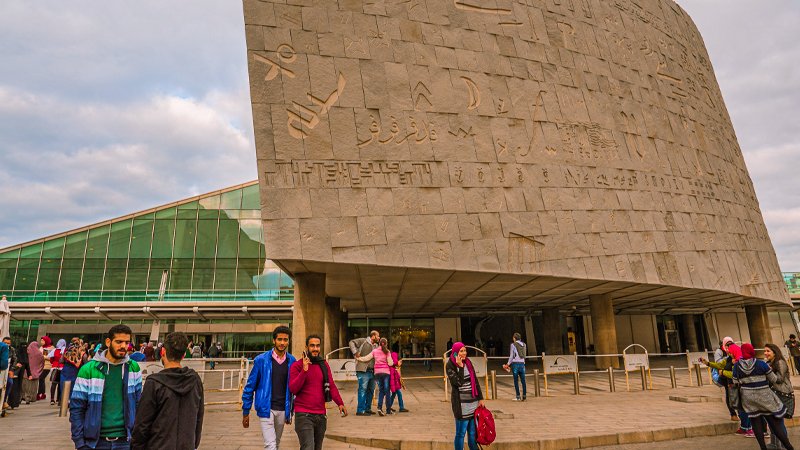For centuries, the Library of Alexandria has captivated the minds of historians, scholars, and enthusiasts alike. Nestled in the vibrant city of Alexandria, Egypt, this ancient marvel was a beacon of knowledge during antiquity. In this article, we embark on a journey to uncover its historical significance, the vast repository of texts it harbored, the influential scholars who graced its halls, and the enigmatic events that led to its demise. Let’s delve into the Library of Alexandria’s secrets and explore the past’s wonders.
Don’t forget to read our related blogs:
Library of Alexandria: Unraveling the Mysteries

Established in the 3rd century BCE by the patron of arts and sciences, Ptolemy II Philadelphus, the Library of Alexandria stood as a symbol of intellectual prowess. It was not just a storehouse of knowledge but a bustling center for research and learning.
The Magnificence of the Library of Alexandria
The Library’s grandeur was awe-inspiring, housing an estimated 40,000 to 700,000 scrolls. These scrolls encompassed various disciplines, spanning astronomy, mathematics, medicine, philosophy, literature, and more. Its significance transcended geographical boundaries, drawing scholars from the ancient world who came to study, exchange ideas, and contribute to this vast intellectual treasure trove.
The Influential Scholars of Alexandria
The Library acted as a magnet for intellectuals and luminaries of its time. Distinguished scholars such as Euclid, the “Father of Geometry,” Archimedes, the renowned mathematician and inventor, and Eratosthenes, the “Father of Geography,” were regular visitors. They thrived in an environment that encouraged curiosity, creativity, and collaboration.
The Role of Papyrus in Preserving Knowledge
The Papyrus, derived from the papyrus plant, was pivotal in preserving the written works of antiquity. Most of the scrolls in the Library of Alexandria were crafted from Papyrus, facilitating efficient and organized knowledge storage. The Library’s dedicated scribes meticulously copied, translated, and preserved texts, ensuring that invaluable information would be passed down through generations.
Ancient Manuscripts in Alexandria
The Library accumulated a remarkable collection of ancient manuscripts from diverse cultures, shedding light on the intellectual pursuits of humanity’s past. These manuscripts covered various subjects, from religious texts to scientific treatises, making the Library a treasure trove of knowledge and a melting pot of cultures.
The Destruction of the Library: A Tragic Loss
The demise of the Library of Alexandria remains a subject of great debate and sorrow. Multiple calamities, including fires, invasions, and political turmoil, are believed to have contributed to its downfall. The most infamous incident was the burning of the Library, resulting in the irreplaceable loss of countless texts and earning its place as one of history’s greatest tragedies for knowledge.
The Legacy of the Library of Alexandria

Despite its tragic end, the legacy of the Library of Alexandria endures in the annals of history. It laid the foundation for future libraries and institutions, inspiring the establishment of academic centers worldwide. The preservation and dissemination of knowledge it championed continue to shape modern societies, emphasizing the importance of learning, collaboration, and the pursuit of wisdom.
Impact of Ancient Libraries on Modern Education
The influence of the Library of Alexandria on modern education cannot be overstated. Its role in preserving knowledge, promoting scholarly pursuits, and fostering cross-cultural exchange set a precedent for academic institutions throughout history and laid the foundation for our educational systems.
FAQs About the Library of Alexandria
What was the primary purpose of the Library of Alexandria?
The primary purpose of the Library of Alexandria was to serve as a repository of knowledge, housing an extensive collection of scrolls and texts from various ancient civilizations. It was also a hub for research, learning, and intellectual exchange.
How many scrolls were estimated in the Library of Alexandria?
The number of scrolls in the Library of Alexandria is a subject of scholarly debate, with estimates ranging from 40,000 to 700,000.
Did the Library of Alexandria hold only Egyptian texts?
No, the Library housed texts from diverse cultures, including Egyptian, Greek, Persian, and Babylonian civilizations, making it a melting pot of knowledge from the ancient world.
Who were some famous scholars associated with the Library of Alexandria?
Eminent scholars such as Euclid, Archimedes, and Eratosthenes were renowned intellectuals who frequented the Library of Alexandria and made significant contributions to the advancement of knowledge.
What led to the destruction of the Library of Alexandria?
The destruction of the Library is believed to have resulted from a series of unfortunate events, including fires, invasions, and political unrest. The most infamous incident was the Library burning during the Alexandria siege.
Conclusion
The Library of Alexandria remains an enduring symbol of the quest for knowledge and the fragility of human achievements. Its rise and fall serve as a cautionary tale, reminding us of the importance of preserving and sharing knowledge for the betterment of humanity. The influence of this ancient marvel resonates through time, inspiring us to cherish the libraries of today and safeguard the wealth of knowledge they hold.


